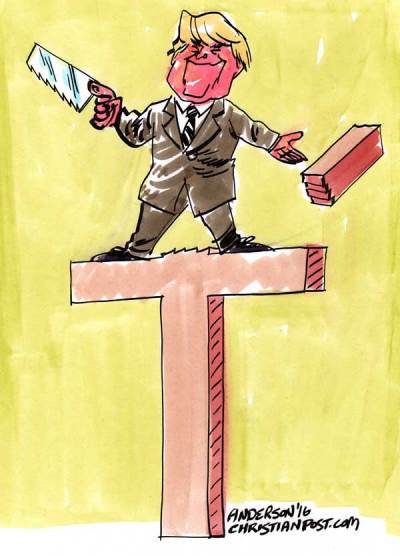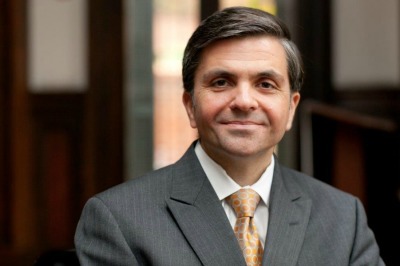Worse Than Hillary: Why I Will Never Vote for Donald Trump

After 33 years, since age 18, of consistently and unhesitatingly voting Republican, locally and nationally, this year will be the exception, if Donald Trump is the nominee.
The first presidential candidate for whom I voted was Ronald Reagan, who then and now embodied my own political theology, as a lifelong United Methodist of evangelical bent. It includes a Christian/natural law anthropology affirming the dignity of all persons from womb to grave, limited government rooted in lawful liberty, reverence for America's founding documents, vigorous enactment of the state's national security duties, and a providential confidence in our republic's future.
Reagan did not fancy himself as a new historical revelation. He tied his beliefs to the Founders and to the continuity of his predecessors, including FDR, a Democrat whom he revered and on whom he modeled his own political style. Reagan could be polemical but also was expert in the unifying priestcraft of American civil religion.
Although he mimics the Reagan-era slogan of "let's make America great again," Trump offers and does not seem to aspire to any of Reagan's political or personal virtues. His selection as the Republican nominee would implicitly renounce Reagan's legacy. Even more troubling, it would break with 160 years of history for the GOP, which emerged from the northern Protestant, anti-slavery revivalism of the 1850s.
Evangelical political activism is imagined as a recent phenomenon, starting with Reagan. But the GOP has always been, however latently, the bearer of a sanguine Protestant ethos and morality. When a Nelson Rockefeller New York operative attended the 1968 Republican Convention in Miami Beach, he reported it felt like a Protestant church bazaar.
In contrast, a Trumpian GOP would at least rhetorically be post-Christian and Nietzschian — garish, full of personal boasts, claims of faux manliness, and sometimes open contempt for the reputedly weak.

The lofty democratic prose of American presidential politics that traces to the New England Puritan social contract, embodied in Reagan's "city on a hill" citation, would be passé. It would be replaced by the chest pounding strong man pomposity that until recently was more typical of Third World authoritarian regimes.
America's republic, rooted in the Anglo-British historical suspicion of despots and centralized power, traditionally glories in impartial laws, not the muscle of individual rulers. George Washington's conscientious denial of a crown and permanent authority is the exemplar for American governance. But obedience to and supreme confidence in a willful personality seems to characterize Trumpism, in ways not seen often in America except with rare demagogues like Huey Long.
Trump professes to be a great patriot, but he does not affirm American Exceptionalism's confidence in republican democracy, with human rights and legal equality for all, as the form of government superior to all others. It's nearly impossible to imagine any American president publicly admiring or excusing the foreign despots whom Trump has implicitly embraced or excused. Nixon in his Machiavellian moods may have privately admired some dictators with whom he collaborated. But he revealed his core conviction when he rebutted Khrushchev's braggadocio that future Americans would live under communism by telling the Soviet braggart his children would live in freedom. Would Trump have that confidence? Or would he have admired Khrushchev's shoe-pounding, vulgar truculence?
There are several Trumpist episodes that are special warnings that he's unsuited to be the successor of even Nixon, much less Reagan, FDR or Washington. His longtime questioning of Obama's birth certificate, his more recent brief allusion to Justice Scalia's possible murder, his allegation that political opponents don't qualify for the presidency because of their parentage, and his embrace of the "Bush lied" Iraq narrative all imply either a belief in or, likelier, a willingness to exploitatively peddle poisonous and absurd conspiracy myths that are un-American and more resemble dark political discourse in the Mideast, Russia, and what once were called banana republics. His original insistence, later kind of retracted, that America should torture its enemies as punishment and murder the families of terrorists in defiance of law more ominously indicate distaste for constitutional and treaty obligations.
Trump is probably not personally a convictional bigot but his flamboyantly odd reluctance, later sort of corrected, to renounce Klansman David Duke and his unapologetic re-tweeting of a neo-Nazi indicate either a willingness to coyly pander to racists or, maybe likelier, a demeaning obsession with defying political correctness to inane lengths. Such antics gain applause from the angry and aggrieved at the sacrifice of dignity and decency.
Several presidents have had deplorable personal lives but none have publicly boasted of it, another tradition that Trump would proudly shatter.
His GOP debate reference to the size of his own genitals is another historical first, confirming that presidential dignity is not his goal, and that his style is more Latin caudillo than American statesman.
At the end of his presidency, Eisenhower explained his mindfulness of America's global image: "Among the qualities that the American government must exhibit is dignity. In turn the principal government spokesman must strive to display it."
Obviously Trump disagrees.
Trump is maybe the most dangerous demagogue ever seriously to seek the presidency, and his unprecedented approach contravenes traditional American democratic norms and any serious Christian political witness.
The likely cost of opposing him will be steep. A Hillary Clinton presidency will resist any legal protections for the unborn, likely try to legitimize euthanasia for the old, sick and depressed, work to further deconstruct the family and gender identity, further undermine religious liberty and free speech by supporting, among other enormities, the Obamacare mandate compelling nuns to subsidize abortifacients. These stances offend traditional Christian thinking.
Her party's enthusiasm for an ever expanding federal entitlement and regulatory state is more a matter of prudential judgment, and some Christians support this pursuit of a more egalitarian society. I think Big Government, whatever the intention, harmfully displaces civil society.
I will not support Clinton. But I think during her presidency opposition to her policies would be strong and mobilizing. A Trump presidency likely would corrupt, enervate and discredit conservative Christian political witness, and therefore would ultimately be more socially destructive. Some conservative Christians disagree.
Politics is always about some level of unsavory accommodation. Christian political theology emphatically does not expect heavenly rule in the kingdom of man. But a Trump administration would uniquely betray the ideals of American democracy, for which reason I would not vote Republican for the first time in my life. In this decision I expect I will not be alone.




























